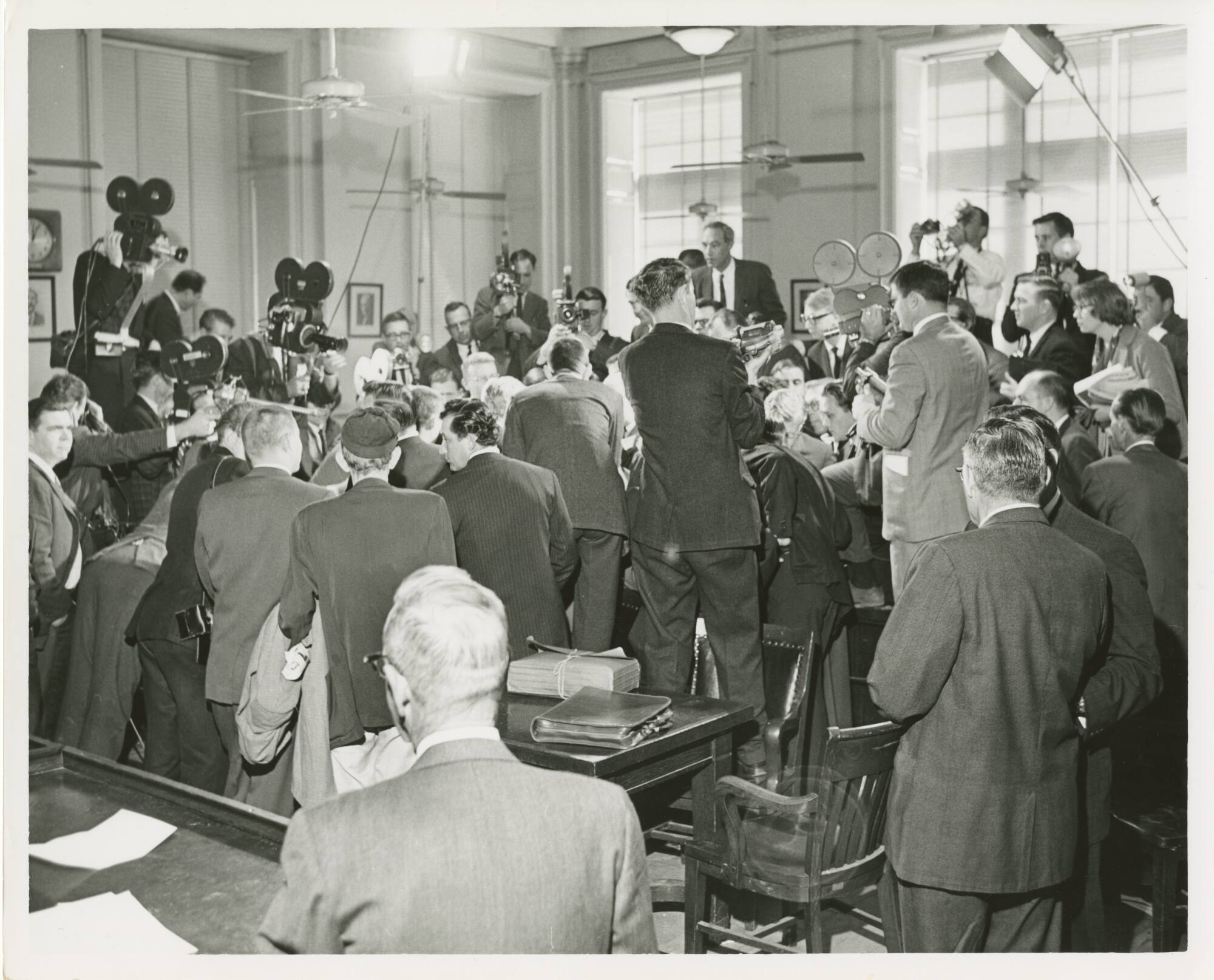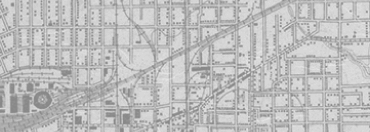


Back
Photograph of world press covering the Jack Ruby trial
Black and white photographic print by Dallas Morning News photographer Jack Beers of a crowd of members of the world press surrounding several seated figures in the center of the photograph. The seated figures are hardly visible because of the reporters, some of whom are standing on the furniture in the courtroom, and it is unknown who they are all straining to see or hear. Many journalists have cameras and notebooks.The photo was taken February 18, 1964, which was the second day of jury selection for the Jack Ruby trial. This photograph was taken in the Wilson courtroom inside the Dallas County Criminal Courts Building. The photograph shows the world press covering what was being called the “trial of the century.” On that date, four prospective jurors were rejected, and Judge Joe B. Brown, Sr., who presided over the Ruby trial, ruled that jurors could not be automatically rejected just because they saw the murder on television. This suited Dallas County District Attorney Henry Wade, but was an unwelcome ruling for Jack Ruby's attorney Melvin Belli. This photograph was also taken on the day when Judge Brown ordered that Jack Ruby could no longer give televised interviews because they were being considered “unsworn testimony.”A few of the journalists can be identified in the photograph, but most are only visible from behind. Ferd Kaufman, a reporter with the Associated Press, is along the top row of people in the photograph left of center standing just below and to the viewer's left of the man standing the highest and holding a camera to his face; Mr. Kaufman's face is unobscured by a camera and he is wearing a dark tie and suit coat with a white shirt. Travis Linn from WFAA in Dallas is on the right side of the photograph standing just below the highest standing reporter on the right side of the photograph. Mr. Linn is seen in profile and the woman standing directly behind him wearing glasses and holding something in her left arm is Patsy Swank, a Dallas stringer for LIFE Magazine. Bob Jackson, a photographer for Dallas Times Herald, is on the far-right edge of the photograph holding a camera to his face and standing behind Ms. Swank.The photograph is printed on glossy paper with a white border on all sides around the black and white image. The reverse of the print has two stamps in blue ink near the upper left corner and stamped so the writing is upside down. One stamp has a rectangular border around the text: "DALLAS MORNING NEWS / FEB 18 1964 / NEWS STAFF PHOTO", with a large dot beneath the border from a red marker.The other stamp has the text: "Photo By JACK BEERS".This object was originally part of the evidence collected by the Dallas County District Attorney’s Office and specifically prosecutors Henry Wade and Bill Alexander during the investigation leading up to the Jack Ruby trial for the murder of Lee Harvey Oswald.
Photograph of world press covering the Jack Ruby trial
02/18/1964
Jack Ruby trial
DA's Ruby file
Press
Cameras
Reporter
Ruby, Jack
Jackson, Bob
Swank, Patsy
Kaufman, Ferd
Linn, Travis
Beers, Jack
Dallas County District Attorney's Office
Dallas County Criminal Courts Building
Associated Press (AP)
WFAA
Dallas Times Herald
LIFE Magazine
The Dallas Morning News
Dallas
Paper
8 1/8 × 10 in. (20.6 × 25.4 cm)
Loaned Courtesy the Dallas County District Attorney's Office/The Sixth Floor Museum at Dealey Plaza
L2017.1.25.48
In addition to setting out a new rule for jury selection, on this day (February 18, 1964) Judge Joe B. Brown ruled that Jack Ruby would no longer be allowed to hold courtroom interviews, which the Dallas County District Attorney's Office argued could be considered "unsworn testimony" that potential jurors might hear. One wonders if that decision by Brown was influenced by chaotic courtroom scenes like the one in this photograph.This image was captured by Dallas Morning News staff photographer Jack Beers. Beers is best remembered for his photograph of the shooting of Lee Harvey Oswald, taken just six-tenths of a second before Dallas Times Herald photographer Bob Jackson's internationally recognized image of the shooting, which won the 1964 Pulitzer Prize in News Photography. - Stephen Fagin, Curator
This image, along with materials from the DA's Ruby file (which is on loan to the Museum) and from the Museum's permanent collection, briefly appeared in a temporary display on the Museum's seventh floor in 2017. - Lindsey Richardson, Curator of Collections
In order to ensure its long-term care and preservation and to facilitate public access, the Dallas County District Attorney's Office placed their Jack Ruby Trial Collection (sometimes referred to as "the DA's Jack Ruby file") on long-term loan with The Sixth Floor Museum at Dealey Plaza in 2017. The Museum is working to make the entire collection accessible through this online collections database. To find out more about this collection or to access materials not yet included here, contact the Museum's Reading Room at readingroom@jfk.org. - Megan Bryant, Director of Collections & Interpretation

Photograph of world press covering the Jack Ruby trial
Black and white photographic print by Dallas Morning News photographer Jack Beers of a crowd of members of the world press surrounding several seated figures in the center of the photograph. The seated figures are hardly visible because of the reporters, some of whom are standing on the furniture in the courtroom, and it is unknown who they are all straining to see or hear. Many journalists have cameras and notebooks.The photo was taken February 18, 1964, which was the second day of jury selection for the Jack Ruby trial. This photograph was taken in the Wilson courtroom inside the Dallas County Criminal Courts Building. The photograph shows the world press covering what was being called the “trial of the century.” On that date, four prospective jurors were rejected, and Judge Joe B. Brown, Sr., who presided over the Ruby trial, ruled that jurors could not be automatically rejected just because they saw the murder on television. This suited Dallas County District Attorney Henry Wade, but was an unwelcome ruling for Jack Ruby's attorney Melvin Belli. This photograph was also taken on the day when Judge Brown ordered that Jack Ruby could no longer give televised interviews because they were being considered “unsworn testimony.”A few of the journalists can be identified in the photograph, but most are only visible from behind. Ferd Kaufman, a reporter with the Associated Press, is along the top row of people in the photograph left of center standing just below and to the viewer's left of the man standing the highest and holding a camera to his face; Mr. Kaufman's face is unobscured by a camera and he is wearing a dark tie and suit coat with a white shirt. Travis Linn from WFAA in Dallas is on the right side of the photograph standing just below the highest standing reporter on the right side of the photograph. Mr. Linn is seen in profile and the woman standing directly behind him wearing glasses and holding something in her left arm is Patsy Swank, a Dallas stringer for LIFE Magazine. Bob Jackson, a photographer for Dallas Times Herald, is on the far-right edge of the photograph holding a camera to his face and standing behind Ms. Swank.The photograph is printed on glossy paper with a white border on all sides around the black and white image. The reverse of the print has two stamps in blue ink near the upper left corner and stamped so the writing is upside down. One stamp has a rectangular border around the text: "DALLAS MORNING NEWS / FEB 18 1964 / NEWS STAFF PHOTO", with a large dot beneath the border from a red marker.The other stamp has the text: "Photo By JACK BEERS".This object was originally part of the evidence collected by the Dallas County District Attorney’s Office and specifically prosecutors Henry Wade and Bill Alexander during the investigation leading up to the Jack Ruby trial for the murder of Lee Harvey Oswald.
Photograph of world press covering the Jack Ruby trial
02/18/1964
Jack Ruby trial
DA's Ruby file
Press
Cameras
Reporter
Ruby, Jack
Jackson, Bob
Swank, Patsy
Kaufman, Ferd
Linn, Travis
Beers, Jack
Dallas County District Attorney's Office
Dallas County Criminal Courts Building
Associated Press (AP)
WFAA
Dallas Times Herald
LIFE Magazine
The Dallas Morning News
Dallas
Paper
8 1/8 × 10 in. (20.6 × 25.4 cm)
Loaned Courtesy the Dallas County District Attorney's Office/The Sixth Floor Museum at Dealey Plaza
L2017.1.25.48
In addition to setting out a new rule for jury selection, on this day (February 18, 1964) Judge Joe B. Brown ruled that Jack Ruby would no longer be allowed to hold courtroom interviews, which the Dallas County District Attorney's Office argued could be considered "unsworn testimony" that potential jurors might hear. One wonders if that decision by Brown was influenced by chaotic courtroom scenes like the one in this photograph.This image was captured by Dallas Morning News staff photographer Jack Beers. Beers is best remembered for his photograph of the shooting of Lee Harvey Oswald, taken just six-tenths of a second before Dallas Times Herald photographer Bob Jackson's internationally recognized image of the shooting, which won the 1964 Pulitzer Prize in News Photography. - Stephen Fagin, Curator
This image, along with materials from the DA's Ruby file (which is on loan to the Museum) and from the Museum's permanent collection, briefly appeared in a temporary display on the Museum's seventh floor in 2017. - Lindsey Richardson, Curator of Collections
In order to ensure its long-term care and preservation and to facilitate public access, the Dallas County District Attorney's Office placed their Jack Ruby Trial Collection (sometimes referred to as "the DA's Jack Ruby file") on long-term loan with The Sixth Floor Museum at Dealey Plaza in 2017. The Museum is working to make the entire collection accessible through this online collections database. To find out more about this collection or to access materials not yet included here, contact the Museum's Reading Room at readingroom@jfk.org. - Megan Bryant, Director of Collections & Interpretation









